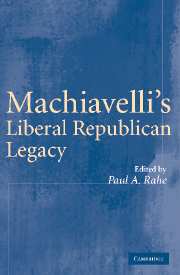Book contents
- Frontmatter
- Contents
- List of Contributors
- Acknowledgments
- Abbreviations and Brief Titles
- Introduction: Machiavelli's Liberal Republican Legacy
- Prologue: Machiavelli's Rapacious Republicanism
- PART I THE ENGLISH COMMONWEALTHMEN
- PART II THE MODERATE ENLIGHTENMENT
- PART III THE AMERICAN FOUNDING
- 7 The American Prince? George Washington's Anti-Machiavellian Moment
- 8 John Adams's Machiavellian Moment
- 9 Thomas Jefferson's Machiavellian Political Science
- 10 James Madison's Princes and Peoples
- 11 Was Alexander Hamilton a Machiavellian Statesman?
- Index
9 - Thomas Jefferson's Machiavellian Political Science
Published online by Cambridge University Press: 24 July 2009
- Frontmatter
- Contents
- List of Contributors
- Acknowledgments
- Abbreviations and Brief Titles
- Introduction: Machiavelli's Liberal Republican Legacy
- Prologue: Machiavelli's Rapacious Republicanism
- PART I THE ENGLISH COMMONWEALTHMEN
- PART II THE MODERATE ENLIGHTENMENT
- PART III THE AMERICAN FOUNDING
- 7 The American Prince? George Washington's Anti-Machiavellian Moment
- 8 John Adams's Machiavellian Moment
- 9 Thomas Jefferson's Machiavellian Political Science
- 10 James Madison's Princes and Peoples
- 11 Was Alexander Hamilton a Machiavellian Statesman?
- Index
Summary
It would be easy to argue that Thomas Jefferson owed next to nothing to Niccolò Machiavelli. The Virginian was exceedingly erudite, and he was keenly interested in the education of the young. On more than one occasion, he took care in outlining a course of study for a protégé. But, in doing so, he never saw fit to include on his list of recommended books The Prince, the Discourses on Livy, the Florentine Histories, The Art of War, or any of Machiavelli's lesser works. Indeed, in his only book, the Notes on the State of Virginia, in his public writings and speeches, and in his letters, he mentions the Florentine but once – and then only to denounce a wayward colleague in the Continental Congress. Regarding John Francis Mercer, in a letter written to James Madison in early May 1784, Jefferson had nothing good to say: “He is very mischievous. He is under no moral restraint. If he avoids shame he avoids wrong according to his system. His fondness for Machiavel is genuine and founded on a true harmony of principle” (PTJ 7:228). Jefferson's allusion to Machiavelli's reliance on appearances suggests that he had both read The Prince and assimilated the critique of virtue elaborated in chapters fifteen through eighteen. That he had not adopted as his own the advice proffered therein by the connoisseur of cunning is evident as well.
- Type
- Chapter
- Information
- Machiavelli's Liberal Republican Legacy , pp. 208 - 228Publisher: Cambridge University PressPrint publication year: 2005

